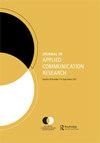对真实黑人无利可图的检验:来自黑人媒体专业人士的见解
IF 1.7
2区 文学
Q2 COMMUNICATION
引用次数: 2
摘要
当前的研究描述了黑人在美国主流媒体中的表现历史——无论是在银幕上还是在幕后——如何影响黑人媒体专业人士,并使21世纪真实黑人的再现复杂化。将霍尔的编码和解码模型与媒体生产研究相结合,我们分析了一家黑人拥有的全方位服务传播公司对22名自我认同的黑人媒体专业人士的采访,该公司以主流品牌的黑人消费者为目标。研究结果表明,黑人的中介表现是不可避免的和有影响力的,但也很狭隘,因为白人观众对真实黑人的看法决定了哪些黑人的描述是有利可图的。相比之下,黑人媒体制作人认为,有利可图的黑人性不是真实的,因为它不包括黑人经历的多样性。我们利用参与者对黑人和媒体角色的理解,为媒体行业如何结合多样性和包容性的概念来创造真正的媒介黑人提供实用的见解。本文章由计算机程序翻译,如有差异,请以英文原文为准。
Examinations of the unprofitability of authentic Blackness: insights from Black media professionals
ABSTRACT Current research describes how the history of Black representation in the United States’ mainstream media – both on screen and behind the scenes – impacts Black media professionals and complicates the reproduction of authentic Blackness in the twenty-first century. Coupling Hall’s model of encoding and decoding with media production studies, we analyze 22 interviews with self-identified Black media professionals at a Black-owned full-service communications company that targets Black consumers for mainstream brands. Findings suggest that mediated representations of Black people, which are inescapable and influential, are also narrow because white audiences’ perceptions of authentic Blackness determine which depictions of Blackness are profitable. By contrast, Black media producers argue that profitable Blackness is not authentic because it does not include the diversity of the Black experience. We leverage participants’ understandings of Blackness and the role of media to provide practical insights into how media industries can incorporate notions of diversity and inclusion to create authentic mediated Blackness.
求助全文
通过发布文献求助,成功后即可免费获取论文全文。
去求助
来源期刊

Journal of Applied Communication Research
COMMUNICATION-
CiteScore
4.00
自引率
8.70%
发文量
52
期刊介绍:
The Journal of Applied Communication Research publishes original scholarship that addresses or challenges the relation between theory and practice in understanding communication in applied contexts. All theoretical and methodological approaches are welcome, as are all contextual areas. Original research studies should apply existing theory and research to practical solutions, problems, and practices should illuminate how embodied activities inform and reform existing theory or should contribute to theory development. Research articles should offer critical summaries of theory or research and demonstrate ways in which the critique can be used to explain, improve or understand communication practices or process in a specific context.
 求助内容:
求助内容: 应助结果提醒方式:
应助结果提醒方式:


